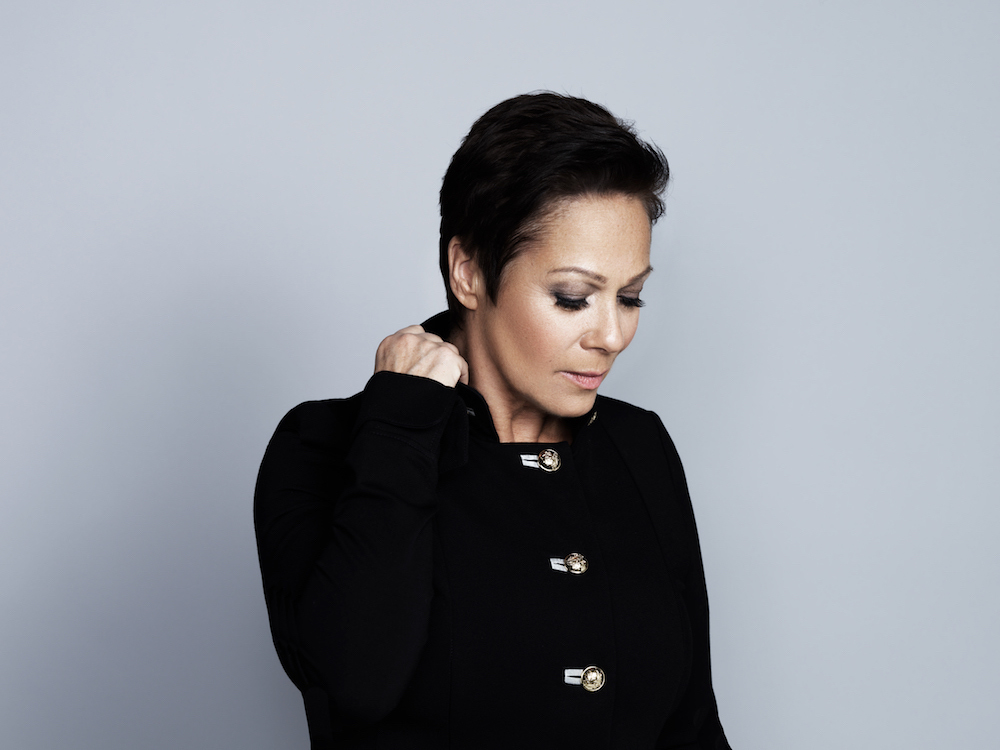Actress Denise Welch holds a special place in the nation’s heart. As the vivacious star of Coronation Street and Loose Women, her persona is known to millions. But her private life has seen battles with depression, addiction and suicidal impulses. In this candid and uplifting interview, Denise explains how she survived the ‘blackness’ – and why her future is shining bright
Suddenly, Denise Welch has a song she wants to play the Happiful crew, during her photoshoot at a Thames-side studio in east London, on a disappointingly bleak Monday morning in early August.

Photography | Joseph Sinclair
When the opening chords of a beautiful acoustic ballad fill the room, Denise gazes out the window and her ice blue eyes momentarily glaze. The voice we are hearing belongs to her global superstar son, Matthew Healy, lead singer of The 1975, and the song, “She Lays Down”, is his raw and heart wrenching account of Denise’s battle with clinical depression, a condition sparked by his birth 28 years ago. The depression left Denise at her lowest ebb, drinking herself into oblivion and using cocaine to numb the endless internal anguish. It’s the reason why we are gathered here today.
I've learned to live with depression. It's like a very unwelcome guest who I tolerate because I know the guest will leave
A few months earlier,
I met Denise during the promotion for her latest success, playing Mrs Otter in the West End musical adaptation of The Wind in the Willows at the London Palladium. When conversation turned to Happiful, she offered an interview about her mental health battles, which began when she was 31, a couple of days after giving birth to Matthew, her first child with her now ex-husband, Auf Wiedersehen, Pet actor Tim Healy.
“I remember sitting on the settee and blackness starting from my feet, working up my body, and I was immediately in a thick, black suicidal depression. It’s the most frightening thing that’s ever happened to me in my life,” says Denise, now 59, who has since learned to spot the physical warning signs of an onset: a metallic taste in her mouth and a sudden tingling in her palms.
What happens afterwards?

Photography | Joseph Sinclair
“I feel nothing,” she says. “Depression depresses every single thing in you, so you lose the ability to have emotions of any kind. At its blackest, you are void of feeling. It’s the reason why Matty called his song ‘She Lays Down’ because when he was older I told him I used to lie down next to him as a baby and pray that something would happen to make me love him. Depression robbed me of the ability to love.” Like most new mums, Denise’s emotions heightened during the first 24 hours of motherhood – she wept when happy, tired and reading cards of congratulations.
Other sensations, however, became abnormal.
This was 1989. Denise had an “out of body experience” on the car journey home from The Garden Hospital, in Hendon, north London, then an all-night panic attack, triggered by the slightest whimper from her newborn. The next day she mistook breaking news on the radio about the Hillsborough disaster for a dream.
Then depression took hold.
For three weeks, Denise lived in her dressing gown (getting clothed, she says, was “terrifying”) and only left the sofa at her flat in Highgate once every four hours to feed her son because her mum, Ann, a trained psychiatric nurse, who spent six weeks caring for Denise, understood the importance of sustaining a strong mother-and-baby bond.

Photography | Joseph Sinclair
“If I ever smell Milton sterilising fluid, it takes me back to those dark days,” says Denise, scrunching up her nose at the memory. At times, she questioned whether Matty was even her baby, and was later diagnosed with being on the verge of a postpartum psychosis – a severe mental illness that affects one in every 1,000 women in the days after childbirth, and is typically characterised by hallucinations, delusional thoughts or beliefs, and erratic behaviour. “Some women believe their babies are possessed by the devil and put them in the microwave,” says Denise. “I didn’t have any bad feelings towards my child, but the way I felt was horrendous. I couldn’t move. I lost nearly two stone in four weeks, I couldn’t eat anything.”
The memories of this time – the isolation, the abject terror, the absent love for her beautiful child – clearly hurt her, even today.
I still get upset when I talk about it,” she says, hurrying away tears with rapid blinking. “It’s not just because I feel sorry for me, or the person I was, but mostly because I feel sorry for women who don’t have the support network that I had.”
Support, however, can sometimes only do so much.
To read more, order the September issue of Happiful magazine
Photography | Joseph Sinclair
Styling | Krishan Parmar
Hair | Amanda Clarke using Paul Mitchell hair products
Make-up | Alice Theobald using Cosmetics a la Carte, Bambi lashes and Pinks Boutique Skincare


Comments